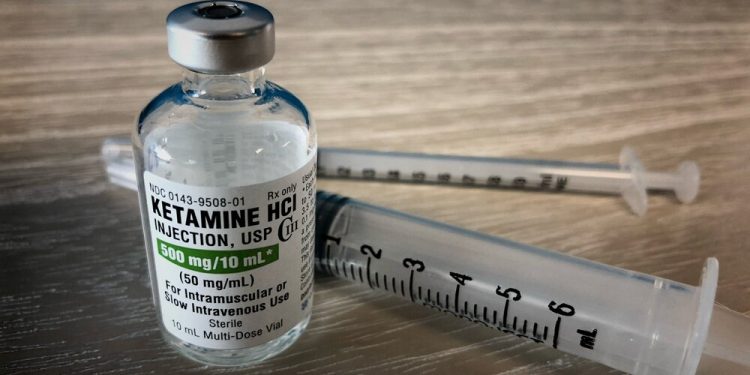Jakarta, Indonesia Sentinel — Indonesia’s Food and Drug Monitoring Agency (BPOM) is reviewing regulatory changes to classify ketamine as a psychotropic substance following a concerning rise in its abuse across the country.
BPOM Head Taruna Ikrar has raised concerns over the misuse of injectable ketamine following a troubling surge in sales. Reports indicate a significant spike in ketamine vials circulating through pharmacies in recent years deviated from regulations, increasing the risk of abuse.
According to report from CNN Indonesia, BPOM data shows 440,000 ketamine vials were distributed in 2024, marking an 87% increase from 235,000 vials in 2023. Alarmingly, the distribution to general pharmacies surged by 246%—rising from 44,000 vials in 2023 to 152,000 in 2024.
The unauthorized distribution of ketamine has become a growing concern, particularly as sales in pharmacies often occur without prescriptions or medical oversight.
Under Indonesia’s Health Law No. 17 of 2023, ketamine use is strictly regulated, requiring a doctor’s prescription and close medical supervision. BPOM plans to propose the reclassification of ketamine to the Ministry of Health.
What is Ketamine?
Ketamine is a general anesthetic primarily used in medical settings for patients undergoing surgical procedures. The drug works by disrupting brain signals responsible for managing pain and consciousness. It is typically administered via injection into a muscle (intramuscular) or a vein (intravenous) under strict medical supervision.
In clinical practice, ketamine is used exclusively in hospitals under a doctor’s supervision. Patients are required to inform their physicians about any allergies or medical history to avoid potentially dangerous side effects.
During administration, medical professionals closely monitor the patient’s vital signs, including breathing, blood pressure, and heart rate. Thus, Ketamine is classified as a controlled substance and requires a valid prescription.
Ketamine Misuse
BPOM officials argue that ketamine, while classified as a restricted drug, has effects similar to psychotropic substances. According to the Drug Enforcement Administration (DEA), ketamine is classified as a Schedule III substance, meaning it has accepted medical uses but also carries a potential for abuse.
According to DetikHealth, Data obtained by BPOM shows its growing misuse among young people, particularly Generation Z, seeking relaxation and euphoric effects. Its misuses ranged from a doping for boosting energy, to recreational use in nightclubs to experience euphoria.
According to Medical News Today, ketamine can produce hallucinogenic effects similar to LSD (lysergic acid diethylamide) and PCP (phencyclidine), commonly known as “angel dust”—both classified as narcotics. Ketamine can produce a sense of euphoria or happiness, which typically lasts for about an hour.
Taruna also noted that many users in their 20s turn to ketamine for various purposes, including pain relief during tattoo procedures. Its anesthetic properties can induce numbness, making users unable to feel pain even in the event of severe injuries.
“The majority of users are young people—Generation Z. They use ketamine to avoid pain while getting tattoos, for relaxation, or to enhance energy, particularly in discotheques where it produces euphoric effects,” Taruna explained.
He suggested that the increasing misuse of ketamine reflects a shift in substance abuse trends among youth. “When certain drugs are banned or restricted, young people tend to seek alternatives that deliver similar effects, such as hallucinations, euphoria, or a ‘high,’” Taruna said. “This is a new trend—essentially a diversion from already regulated and controlled substances.”
Ketamin Risks
Improper or high doses of the drug can trigger severe side effects and unsupervised ketamine use also increases the risk of dependence.
The misuse of ketamine can lead to serious neurological conditions, including cognitive dysfunction, mental health disorders, hallucinations, and anxiety or depression.
In severe cases, it may even result in suicidal thoughts or actions, including what is known as the “K-hole” effect—a near-death-like experience in which users are unable to interact with their surroundings.
South Korean President Yoon Suk-yeol Survives Impeachment Vote Amid Political Uncertainty
Proposed Regulatory Changes
Because of its risks, ketamine use requires strict medical oversight. BPOM emphasized the sale of ketamine in pharmacies is prone to misuse and abuse.
Therefore, to ensure tighter oversight, the agency is proposing that ketamine be reclassified as a psychotropic drug, allowing for stricter monitoring and control.
“Currently, ketamine is only categorized as a restricted drug used as an anesthetic. From a pharmacological perspective, ketamine should be classified as a psychotropic substance. However, our regulations have yet to reflect that,” Taruna said during a press conference on Friday, December 6, as reported by DetikHealth.
Taruna emphasized that the proposed reclassification would be submitted to Indonesia’s Ministry of Health, which holds jurisdiction over drug classification decisions.
“This will be presented to the Ministry of Health because the authority to determine drug classifications lies with them, not BPOM,” he clarified.
BPOM is currently investigating how ketamine has been widely distributed through pharmacies without clear medical indications.
(Raidi/Agung)


























